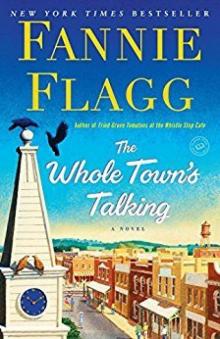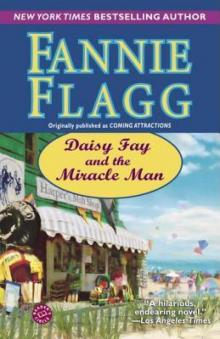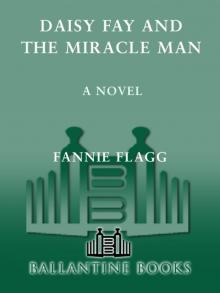- Home
- Fannie Flagg
Can't Wait to Get to Heaven Page 16
Can't Wait to Get to Heaven Read online
Page 16
“Just a small formality, making sure that down the line you are protected if anything…ah…if you need something…and that we are protected. We feel it’s best to take care of it now, so we can get it processed as soon as possible.”
“Protected from what?”
Sprague jumped in. “It’s really more to assure you that no expenses will be incurred while your aunt is here under our care.”
“Oh, I see,” said Norma. “I appreciate that, but really, you shouldn’t have to pay our bills, it’s not your fault this happened.”
If anything was music to somebody’s ears, to Sprague and Pixton, Norma’s last statement, “It’s not your fault,” was an entire concerto by Beethoven.
Norma continued, “If anything, we should apologize to you. I feel so bad about that little nurse. I think she was scared half out of her wits. I hope she’s all right. They say she hasn’t come back yet.”
“I’m sure she’s fine, Mrs. Warren.”
“I hope so. I’m sorry I got so upset and fainted twice, but you have to understand, you may be used to this happening all the time, but I’m not.”
They both nodded sympathetically. “No need to apologize to us, Mrs. Warren. The only thing you can do for us is to sign the paper so we can get everything in motion.”
Norma still seemed reluctant. “Maybe I should ask my husband. I don’t think he would want you to pay for anything. It’s probably going to be a big bill.”
The lawyer jumped in. “Don’t you worry about it, we have insurance that covers this kind of thing.”
Franklin added: “Very common, happens all the time…”
The lawyer Sprague nodded. “Very common.”
“Well, all right,” said Norma. “I still think I shouldn’t, but if you insist.”
“Oh, we do, it’s the least we can do.”
“The least we can do,” echoed the lawyer.
As Norma signed the paper, it was all they could do not to jump up in the air and give each other a high five, but they remained cool. She had not read the clause stating that she waived her right to hold the hospital responsible.
Mr. Pixton pulled out his card and wrote a number on it. “Here is my office number and my home number, and promise me, if you or your family need anything, anything at all, you call me.”
“And here’s mine,” said the lawyer. “I’m available twenty-four hours a day.” After they left the room, Norma turned to the doctor and said, “Wasn’t that nice of them, to do that?”
The doctor wanted to say something, but didn’t.
As both men stood waiting for their elevator, Franklin said quietly, “We just dodged a big fat bullet.”
Later, back at his office, Winston Sprague felt not even the slightest twinge of guilt. He had an obligation to protect the hospital before that slimy shyster, slip and sue, ambulance-chasing lawyer Gus Shimmer found out and showed up and got ahold of the Warren woman. Somebody inside the hospital had been supplying him with information about every potential malpractice event that took place, and it had cost the hospital millions. Good thing the Warren woman had been so stupid and had not read what she’d signed. She had a legitimate case; it was clearly their fault. But how much should one mistake cost? Was it worth the millions of dollars they would have to pay? It’s not like they were trying to kill their patients.
Franklin Pixton went straight back to his office as well. Now that the legal matter was handled with Mrs. Warren, he needed to get to the bottom of the situation ASAP. He pushed his intercom. “Brenda, I want the names of all staff on duty this morning.”
One staff member, the young nurse who an hour earlier had run out of Elner’s room screaming at the top of her lungs, had just been picked up by her mother at a 7-Eleven about two miles from the hospital. As they drove home her mother asked her again.
“Are you sure you don’t want me to take you back to work?”
“I told you, I’m never going back there. I quit.”
“You can’t just quit.”
“Yes, I can too.”
“Are you going to let all your nurse’s training go to waste over this one little incident?”
“When dead people sit up and start talking, you bet I am.”
“What will you do?”
“I’m doing nails, like I wanted to in the first place.”
The mother sighed. “Well, it’s your life, I guess.”
After the MRI
4:30 PM
A bit later that afternoon, after Elner’s MRI and CAT scan, they wheeled her up to intensive care and plugged her back up to all the machines again. By this time Norma was back in the waiting room with the rest of them, wondering what was going on. Macky was getting very impatient. He finally walked over to the desk and asked the girl where Elner was, and why they weren’t coming out and telling them anything. The girl made a phone call and then said, “She’s back up in intensive care, that’s all the information I have.”
“Where is intensive care?”
“That’s on seven, but you have to wait.”
Macky did not wait. He walked over to the others and said, “Come on, this is ridiculous, we are going to see her right now.” Susie stayed behind in case the doctor came out. When they reached the seventh floor Macky said to Norma and Linda, “Wait here and let me go in first, then I’ll come back and get you.” Macky passed by several rooms before he found her room, and just as he was about to go in, a male nurse was just walking out. When he saw Macky standing there, he asked somewhat indignantly, “Just where do you think you’re going?”
“I’m going in to see my aunt,” said Macky.
“Oh no, you’re not!” the nurse said, closing the door behind him. “Can’t you read? The sign says no visitors.”
“Oh, I can read, but I’m going to see my aunt.”
“Oh no, you’re not!” he said again, putting his hands on his hips and almost stomping his foot.
Macky looked at him and said calmly, “Now, buddy, if you want to try and stop me, that’s your business, but make no mistake, I am going in.”
The nurse sized up the man standing in front of him. He was older and not as tall as he was, but there was something about the look in Macky’s eye that caused the nurse to suddenly step aside and let him go in. He sensed that this man was not someone he wanted to tangle with.
Macky walked into the room and went over to the bed; when Elner looked up and saw who it was, she was glad to see him. “Hey, Macky!” she said, trying to reach for his hand.
“Hey, yourself,” he said, looking at her with a smile. “How you doing, old gal?”
She laughed. “I’m all hooked up.”
“I can see that,” he said.
“This is a fine mess, isn’t it? How did Linda get here so fast? What time is it anyway? I’m all turned around, I hope I didn’t make you miss work.”
“Don’t worry about it. How do you feel?”
“Oh, fine, except these wasp bites are starting to itch. Are Norma and Linda still here?”
“They’re right outside, waiting to see you.”
“Macky,” she said, looking up at him. “I sure am sorry I fell out of that tree. Is Norma real mad?”
“Nooo, not at all, she’s just glad you are OK. Do you need anything?”
“I need somebody to go over and give Sonny his breakfast and feed my birds; make sure my oven is off.”
“All that’s been taken care of. Ruby and Tot already did it.”
“They did? That’s a relief. By the way, where am I?”
“You’re at the Caraway Hospital in Kansas City.”
“That’s what I figured, but how did I get here?”
“The ambulance picked you up and brought you.”
“An ambulance? I don’t remember being in an ambulance.”
“You were knocked out.”
“I was?”
“Out cold.”
“Did they have the siren going?”
“Sure did.”
/> “Well, shoot, I had a ride in an ambulance and I missed the whole thing.”
“Are you up to seeing Norma and Linda? They’re having a fit to see you.”
“Oh, sure…And Macky, find out what they did with my robe, will you?”
When Norma and Linda walked into the room, they went over and kissed her, and Aunt Elner said to Linda, “I’m sorry you had to make the trip for nothing.”
“Don’t be silly, I’m just so glad you are all right, we thought you were dead.”
“I thought I was too,” she said. “When I woke up alive, I was as surprised as anybody.”
“Well, I doubt that,” said Norma.
It was around five-thirty by the time the doctor finally had all the results of the tests and came to find Norma and Macky. When they came out into the hall, he explained that so far all they had found were the wasp stings and a few bruises, but everything else looked good. Then Macky asked him, “What the hell happened earlier? Was she in some sort of a coma and just snapped out of it?”
“I really can’t say what happened.”
“Why did you think she was dead?”
“Mr. Warren, all our indications said that she was dead.”
“Well, maybe you should check your indications then, because something was off.”
The doctor shook his head. “Mr. Warren, we just don’t know what went wrong yet, but I promise you, we’ll get to the bottom of it, and as soon as we know, I’ll let you know.”
Norma saw that the doctor seemed genuinely upset and looked absolutely exhausted, and she said, “We’re just happy she’s all right now, and her hip’s not broken.”
“No, no broken bones, but we do need to keep her for a few days and do a few more tests just to make sure she’s OK.”
Norma said, “Whatever you think, Doctor.”
As the doctor walked away, Norma said, “I hope he doesn’t get into any trouble.”
A few minutes later, when Dr. Henson came into Franklin Pixton’s office, he was visibly shaken.
Franklin asked, “What is her present condition?”
“Stable, vital signs all normal, MRI, CAT scan both normal.”
“What happened?”
“She flatlined…. I tried everything.”
Franklin held up his hand to stop him, and pushed the intercom. “Order another complete check on all the OR machines immediately.” He then sat back. “All right, Bob, go on.”
“She came in on a Code Three and by the time I got to her, she was gone. But we did everything…. What can I say?”
“You know there will be an inquiry. I’m going to have to drug test you.”
“Yes, I know.”
“Are you OK?”
The doctor nodded. “Yes, I’m just tired, but that’s no excuse. I take full responsibility, but I just don’t understand how I could have been so wrong. I’ve gone over and over—”
“Where is she now?”
“We’re keeping her in intensive, and I’ve called in a neurologist to do a cognitive exam first thing in the morning.”
After the doctor left his office, Franklin was surprised that something like this had not happened sooner. The doctors working down in ER were exhausted, surviving week after week on two to three hours’ sleep, working under pressure, having to make life-and-death decisions. It was almost inhuman to expect a person to go through that. Franklin understood about being tired. Everybody was tired. He himself had been exhausted for years. It seemed that all he did was careen from one catastrophe to another. If it wasn’t one damn thing, it was another: appease this one, meet with this or that group, who were bellyaching about something, threatening to walk out on strike. The entire hospital was always on the verge of some disaster.
In the past ten years, operating expenses had shot through the roof. With all the criminals and dope fiends in and out of the hospital, they were now forced to spend a fortune on security guards, then last year they had to fire seven security guards for stealing painkillers. The linen supply company had upped their prices, the garbage pickup service they used went on strike, their computer system had to be completely updated when some hackers got into the system and gained access to all their patients’ reports.
Caraway Hospital was an institution originally set up to help people, but now everything seemed intent on making it almost impossible. The insurance companies, the unions, the shyster lawyers; if they could manage to get a patient in and out of the hospital these days without getting sued or robbed, it was an accomplishment. Their emergency room was jammed with people who were now using it as their own personal clinic. Forget the hospital getting paid for their services; most patients did not have insurance, and for the ones who did, it took months and years to get full payment, and all the while his payroll had to be met. The people who could afford to pay wound up paying a small fortune for what most everybody else got for free. Of course, there were people who really could not pay. He understood that, but it was the others, the ones looking for any excuse to sue, the ones who believed they shouldn’t have to pay, that medical care was owed to them. Never mind that they were costing the system millions and forcing him to lay perfectly good workers off, leaving others underpaid and overworked.
He was vehemently opposed to the somewhat gleeful practice of the public and the government soaking the rich. Most of the rich people he knew, including himself, worked very hard for their money and were responsible for almost all the hospital’s larger donations. It was the generosity of the rich that kept it going. He did not think the rich owed everybody else a free ride; and yet, that very thing was happening at Caraway. Everybody wanted a free ride, including a lot of his staff, and if the hospital was to survive, things had to change soon or he did not hold out much hope. He worried about both the rich and the poor, about what would happen to them when the hospital was forced to close its doors for good.
Brenda buzzed him. “Your wife on three.” He closed his eyes for five seconds. He knew she was calling about the Have a Heart Charity Ball tonight. He picked up and listened to her problems about the centerpieces not being the right color.
“Yes, dear,” he said. “Yes, dear, I agree, that’s terrible.”
At that very moment a phone call was made on the q.t. from the hospital cafeteria to the lawyer Gus Shimmer.
“Gus?”
“Yeah.”
“It’s me.”
“What do you have for me?”
“Patient. Mrs. Shimfissle, closest relative, Mrs. Norma Warren.”
“Yeah?”
“Mistakenly pronounced dead, left for five hours.”
“You’re kidding?”
“No, I saw the file.”
“Have they signed anything yet?”
“Yes…the two happiness boys got to her right away.”
“That’s OK. This could be big. Really big. Telling you somebody’s dead is one hell of a misdiagnosis.”
“I thought so.”
“If it goes, you’re in for twenty percent this time. OK?”
“Plus my usual finder’s fee.”
“Of course,” he said, thinking but not saying, “You greedy little bastard.”
But when the two-hundred-and-eighty-pound lawyer hung up, he was ecstatic. This could be a really good case. He was not worried that the family had already signed the usual no-responsibility waivers. There was not a waiver, an irrevocable trust fund, a prenuptial agreement, a contract, verbal or written, that he could not get somebody out of, or around. Caraway Hospital was his big fat personal gold mine, just waiting to be mined over and over again. He calculated that after he paid off the nurse and maybe threw a little dough at the clients, by the time he got through, he would make plenty. Of course his wife, Selma, hated it whenever he took on another lawsuit against a hospital. She said, “Gus, you keep suing these hospitals for every little thing. God forbid if I should ever wind up in the emergency room, and they find out who I’m married to, they will be afraid to touch me.”
&nb
sp; A Doctor’s Dilemma
At around five that afternoon, Reverend Susie Hill, who was still a little shaken up from the ordeal of having seen a woman she thought was dead fly by her and wave at her, left the hospital, and Norma, Macky, and Linda stayed with Elner until visiting hours were over. They decided Linda would go home with Norma and Macky that night, and they would all try to get a good night’s sleep and come back in the morning. If Aunt Elner was still doing as well as she was tonight, Macky would drive Linda to the airport so she could get back to work tomorrow.
Downstairs, Dr. Bob Henson had just handed his urine sample over to the guy working in the lab, and walked out the door. He had started out in medicine the same way most had: young, full of ambition, fueled with the desire to help mankind, to save lives, make a difference. Now he was thirty-two, a little jaded, but mostly exhausted and pretty fed up with the stupidity of the mostly flotsam and jetsam array of humans that came in and out of the emergency room, day and night. The sheer futility of spending hours digging bullets out of young men, sewing up knife wounds, dealing with drug overdoses, drunks, insane people, beaten-up prostitutes, suicide attempts, treating the same ones over and over again for the same thing, had made him quick-tempered and irritable. Having to constantly deal with the screaming mothers of dead sons shot down in the streets over some gang rivalry, having to tell nice middle-class parents that their children were dead because they had been driving doped up or drunk, or had been hit by someone who was. In only two years of ER his opinion of the human race had plummeted.
He was beginning to believe that a lot of people were just taking up space, wasting the time of doctors, draining the hospital’s resources, using up time and energy and money that could be used elsewhere. When he confided his feelings to a fellow ER physician, the guy had said, “Jesus, Bob, what an attitude, you better get some help.” But he hadn’t. He hadn’t had time; with his life at the hospital, where he spent long hours either in ER or in his grubby, messy little office, doing endless paperwork, or trying to grab a few minutes of sleep on the lumpy futon, he barely had time to brush his teeth.

 Standing in the Rainbow
Standing in the Rainbow Welcome to the World, Baby Girl!
Welcome to the World, Baby Girl! The Whole Town's Talking
The Whole Town's Talking A Redbird Christmas
A Redbird Christmas I Still Dream About You
I Still Dream About You Fried Green Tomatoes at the Whistle Stop Cafe
Fried Green Tomatoes at the Whistle Stop Cafe Can't Wait to Get to Heaven
Can't Wait to Get to Heaven Daisy Fay and the Miracle Man
Daisy Fay and the Miracle Man The Wonder Boy of Whistle Stop
The Wonder Boy of Whistle Stop The All-Girl Filling Station's Last Reunion
The All-Girl Filling Station's Last Reunion I Still Dream About You: A Novel
I Still Dream About You: A Novel Daisy Fay and the Miracle Man: A Novel
Daisy Fay and the Miracle Man: A Novel